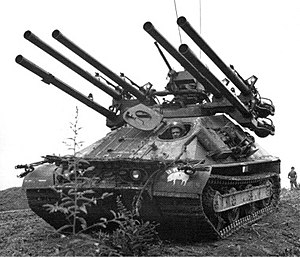M50 Ontos
| Rifle, Multiple 106 mm, Self-propelled, M50 "Ontos" | |
|---|---|
 |
|
| Type | Tank destroyer |
| Place of origin | United States |
| Service history | |
| In service | 1956–69 |
| Used by | United States |
| Wars |
Vietnam War Operation Power Pack |
| Production history | |
| Designer | Allis-Chalmers |
| Designed | 1952 |
| Manufacturer | Allis-Chalmers |
| Produced | 1955–57 |
| Number built | 297 |
| Variants | M50A1 |
| Specifications | |
| Weight | 8,600 kg |
| Length | 3.83 m |
| Width | 2.59 m |
| Height | 2.13 m |
| Crew | 3 (driver, gunner and loader) |
|
|
|
| Shell | High Explosive Anti-Tank High Explosive Squash-Head Anti-Personnel |
| Caliber | 106 mm |
| Muzzle velocity | 500 m/s |
| Effective firing range | 2,750 m |
| Maximum firing range | 7,700 m |
|
|
|
|
Main
armament |
6 × M40 recoilless rifles |
|
Secondary
armament |
1 × .30-caliber machine gun |
| Engine | GM 6-cyl 302 in³ 145 hp |
|
Operational
range |
185 km |
| Speed | 48 km/h |
The Ontos, officially the Rifle, Multiple 106 mm, Self-propelled, M50, was a U.S. light armored tracked anti-tank vehicle developed in the 1950s, a fast tank killer for airborne forces.
It mounted six M40 106 mm recoilless rifles as its main armament, which could be fired in rapid succession against single targets to guarantee a kill. It was produced in limited numbers for the U.S. Marines after the U.S. Army lost interest in the project. The Marines consistently reported excellent results when they used the Ontos for direct fire support against infantry in numerous battles and operations during the Vietnam War. The American stock of Ontos was largely expended towards the end of the conflict and the Ontos was removed from service in 1969.
The Ontos (Greek for "thing") project was created to be an air transportable tank-destroyer capable of being lifted by the cargo aircraft of the 1950s. This limited it to a weight between 10 and 20 metric tons. The Ontos also had to use the six-cylinder engine then widely used in the Army's GMC trucks. Allis-Chalmers was awarded a contract on August 12, 1955, for 297 vehicles.
Allis-Chalmers' first vehicle, completed in 1952, was based on the running gear of the M56 Scorpion light anti-tank vehicle. The vehicle mounted a cast steel turret with two arms holding three rifles each. This early model could traverse the turret only about 15 degrees. A second prototype used a new suspension system, new tracks, and a newer turret with about 40 degrees traverse. The vehicle could only carry eighteen rounds for the main guns inside the vehicle due to limited space. Four of the rifles also had .50-caliber coaxial spotting rifles attached, each of which fired a round with the same trajectory as the 106 mm round, and that gave off a puff of smoke on impact. The spotting rifles were used to line up the 106 mm recoilless rifles with the target. The Ontos also carried a single .30 caliber M1919A4 machine gun for anti-infantry use.
The vehicle was taken to the Aberdeen Proving Ground where single rifles had been tested earlier. When all six weapons were fired at once, the back blast from the firing knocked bricks out of a nearby building and knocked the rear windows out of several cars. The prototype and testing stage was completed by 1955, at which point the Army canceled its order.
...
Wikipedia
